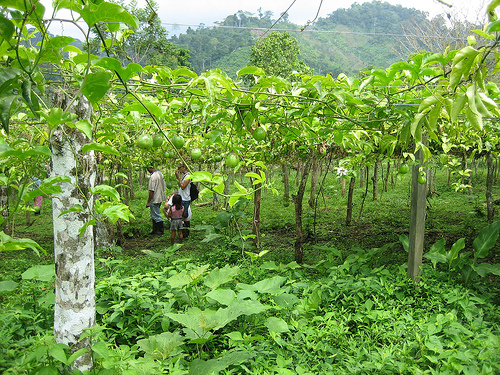The distance between the northwestern Colombian city of Medellín and the peace community of San José de Apartadó, located in the Urabá region near the Panamanian border, can’t be much more than 250 kilometers. If traversed in a cargo truck that is incompatible with hills and curves, however, the journey can span two days, which I learned while hitchhiking through Colombia in the spring of 2009. The truck driver, who had kindly packed my two friends and me into the space of his cab along with our luggage, spent the trip trying to convince us to alter our destination given his conviction that—contrary to its pacifistic pretensions—the peace community was in fact a FARC stronghold.
Since its founding in 1997, the community has rejected collaboration with all armed parties to the Colombian conflict—military, paramilitary, and guerrilla alike—but has been the subject of constant accusations of alignment with one or more sides. As of its twelfth anniversary, it had suffered 184 assassinations out of a population of approximately 1500. Twenty-four of these are attributed to the FARC (Revolutionary Armed Forces of Colombia), while the rest are attributed to the armed forces and/or paramilitary outfits.
[S]tate purveyors of terror often seek to exonerate their behavior by assigning the crime of terrorism to the population on the receiving end of it.
The community runs on a system of collective work groups that cultivate crops ranging from miniature bananas to cacao. As for the fruits of military-paramilitary cooperation in the area, one example is the brutal 2005 massacre of eight persons, among them several young children and Luis Eduardo Guerra Guerra, who, despite his surname, was a prominent peace community leader. In another 2005 massacre, the 15-year-old daughter of community co-founder María Brígida González was killed in her sleep by members of the Colombian Army’s 17th Brigade, who claimed the girl—Eliseña—was a FARC combatant.
During my week-long stay in San José de Apartadó in 2009, González speculated to me that one reason for armed attacks on unarmed farmers in a strategically valuable and resource-rich area was to “sow terror” in order to encourage the evacuation of human obstacles to the unbridled extraction of minerals, oil, and wood (not to mention the unbridled movement of drugs).
As has been amply demonstrated in contemporary global history, state purveyors of terror often seek to exonerate their behavior by assigning the crime of terrorism to the population on the receiving end of it. In the case of Colombia, the Álvaro Uribe administration was fortunate enough to be lent the PR services of The Wall Street Journal’s honorary paramilitary Mary Anastasia O’Grady, who in a December 2009 article titled “The FARC and the ‘Peace Community’” took it upon herself to proliferate the notion of an alliance between the two groups.
After approvingly reminding readers that Uribe had “expressed his concern about the possibility that some ‘human rights’ groups are actually fronts for terrorists,” O’Grady reported testimony according to which the peace community of San José de Apartadó—which has enjoyed the backing of notorious human rights/terror groups like Amnesty International—“helped the FARC in its effort to tag the Colombian military as a violator of human rights.”
Given that O’Grady’s exposé was published the year after the revelation that Colombian soldiers had murdered possibly thousands of civilians and then dressed the corpses in FARC attire in order to accrue bonus pay and extra holiday time, it seems the nation’s military has done a fine job of tagging itself as a violator of human rights.
As for whether the recent release of hostages by the FARC will compel the current administration to engage in meaningful peace negotiations with the guerrilla organization, it may be that the FARC is too useful an adversary—in supplying a justification for military excess—to renounce entirely. The extensive operations in Colombia by international private security companies meanwhile underscore the lesson from María Brígida González regarding the unprofitability of peace.

